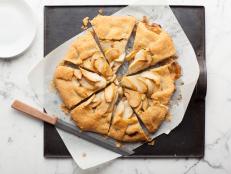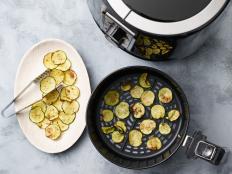Why You Should Be Eating More Prebiotic Foods
These gut-healthy foods are just as important as probiotics.

fordeno/Getty Images
By now, you’ve probably heard about the many benefits of probiotics. They’re most commonly linked with aiding digestion and immune function and can be obtained through foods and/or supplements. If you swear by probiotics, it's also important to know about other compounds essential to gut health that don’t get as much shine: prebiotics. Prebiotics are non-digestible components that help probiotics grow and thrive. They work synergistically with probiotics to optimize gut function, enhance mineral absorption and improve overall health. Think of prebiotics as food for probiotics.
What Are Prebiotics?
Fructo-oligosaccharides, galacto-oligosaccharides and inulin are the three major groups of beneficial prebiotics and certain strains of probiotics thrive off of certain types of prebiotics. Once they ferment in the digestive tract, they can increase the production of short-chain fatty acids (SCFAs), which play an important role in health maintenance and disease prevention. Some studies have even shown prebiotic intake may alleviate IBS symptoms, prevent specific allergies and reduce markers of insulin resistance.
How to Eat More Prebiotics
So basically, it’s really important to regularly consume prebiotics, especially if gut health is a concern. The good news is that prebiotics can be easily found in foods that are commonly incorporated into our cooking like leeks, onions, garlic, scallions and asparagus. Other foods like banana, sweet potato and yams also have prebiotics in lesser amounts. By eating varied meals that include fiber-rich foods, you’ll be more likely to up your prebiotic intake without overthinking it too much. Including aromatics like onion and garlic is second-nature to many of us, but now you have more of an incentive to add them to your cooking!
Keep in mind that if you’re not used to eating high-fiber meals, you want to make sure it’s a gradual shift to reduce unpleasant gastric symptoms like bloating and gas. Start slow and see how your body feels as you add more prebiotic-rich foods. It’s also important to increase hydration as you up the fiber to avoid constipation.
What About Prebiotic Supplements?
Since probiotic supplements are so popular, you may be thinking, “Should I also consider taking a supplement for prebiotics?” There’s lots of synbiotic products that offer probiotics and prebiotics in one or food products that claim to be a rich source of prebiotics. Like any supplement, whether it's a good fit for you depends on a number of factors. (Not everyone needs to be supplementing.)
For example, perhaps you have a digestive condition that negatively impacts nutrient absorption regardless of the foods you eat, and in this case, supplementation may be helpful. However, generally speaking, supplements are intended to supplement nutrition and should not be a replacement for balanced meals. Eating a variety of meals that include plant foods will provide a range of most, if not all, of the vitamins, minerals and compounds your body needs. Also keep in mind that if you’re on a low FOD-MAP diet because of digestive issues (this should always be done under the direction of a registered dietitian), prebiotics are not appropriate as they may worsen gastrointestinal symptoms.
10 Prebiotic Foods to Add to Your Plate
- Leeks
- Onions
- Garlic
- Scallions
- Asparagus
- Banana
- Sweet potato
- Yams
- Artichokes
- Beans
As a registered dietitian/nutritionist and Certified Diabetes Educator, Wendy Lopez, MS, RDN, CDCES is passionate about accessible and culturally relevant nutrition education. She is the co-host of the Food Heaven Podcast, and the co-founder of Food Heaven, an online platform that provides resources on cooking, intuitive eating, wellness and inclusion. When not working on creative projects, Wendy also provides nutritional counseling and medication management to patients with diabetes.
*This article was written and/or reviewed by an independent registered dietitian nutritionist.
Related Links:
































